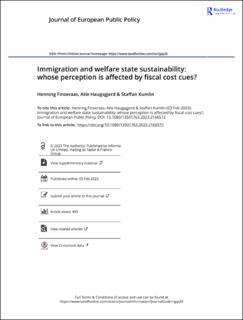Immigration and welfare state sustainability: whose perception is affected by fiscal cost cues?
Peer reviewed, Journal article
Published version
Permanent lenke
https://hdl.handle.net/11250/3114745Utgivelsesdato
2023Metadata
Vis full innførselSamlinger
- Publikasjoner fra CRIStin [716]
- Tidsskriftpublikasjon [389]
Originalversjon
10.1080/13501763.2023.2166572Sammendrag
Who reacts politically to fiscally costly immigration? A political economy tradition holds that reactions depend on economic self-interest, whereas a social psychology tradition emphasizes generalized political orientations and trust. Past work largely leans in favor of the latter tradition. We make three contributions. First, our dependent variable is a concrete perception of welfare state sustainability, arguably better suited to capture self-interest. Second, both the political economy- and social psychology traditions have been studied narrowly; we separate between multiple interests (including economic local context), and compare several types of trust orientations. Third, we use machine learning methods well-suited to analyze treatment heterogeneity in a randomized survey experiment. We find support for both interest-based and social psychological explanations. As for the latter, what matters is not only, or even mainly, orientations/trust related to immigration. Rather, generalized political distrust strongly regulates when costly immigration cues trigger welfare sustainability worries. Immigration and welfare state sustainability: whose perception is affected by fiscal cost cues?
